中考新目标英语知识梳理:(七下)Units1-12
文档属性
| 名称 | 中考新目标英语知识梳理:(七下)Units1-12 | 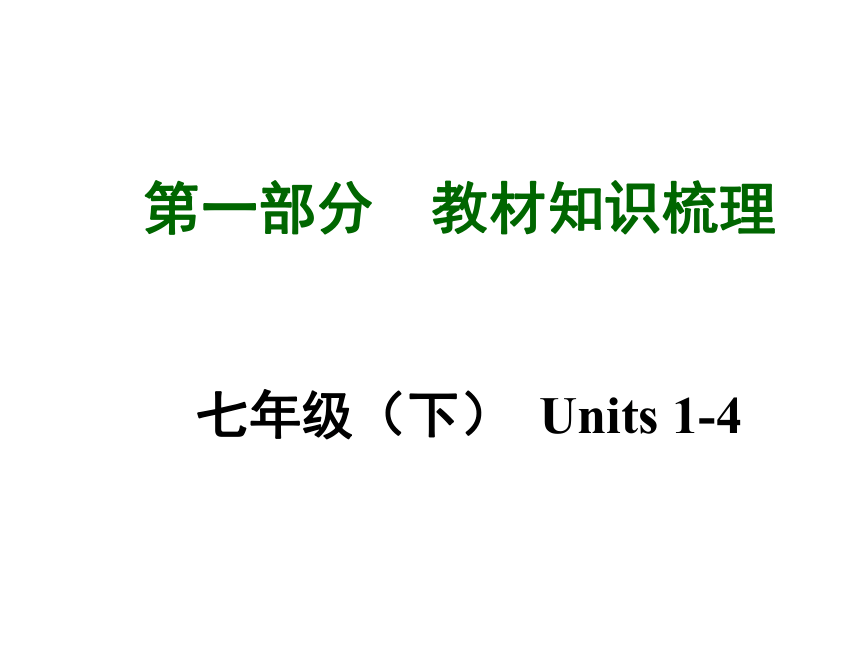 | |
| 格式 | zip | ||
| 文件大小 | 2.6MB | ||
| 资源类型 | 教案 | ||
| 版本资源 | 人教新目标(Go for it)版 | ||
| 科目 | 英语 | ||
| 更新时间 | 2015-02-04 18:50:27 | ||
图片预览

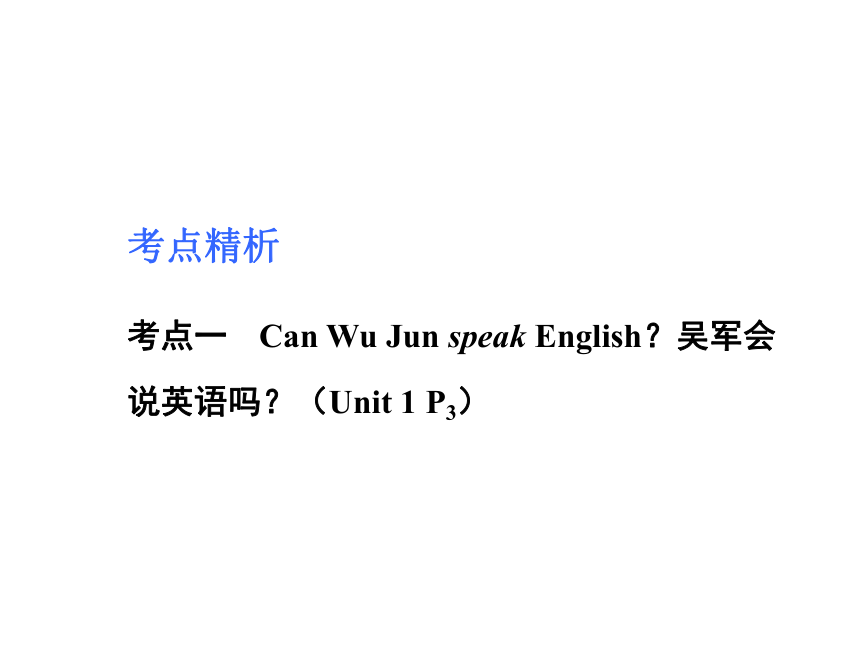
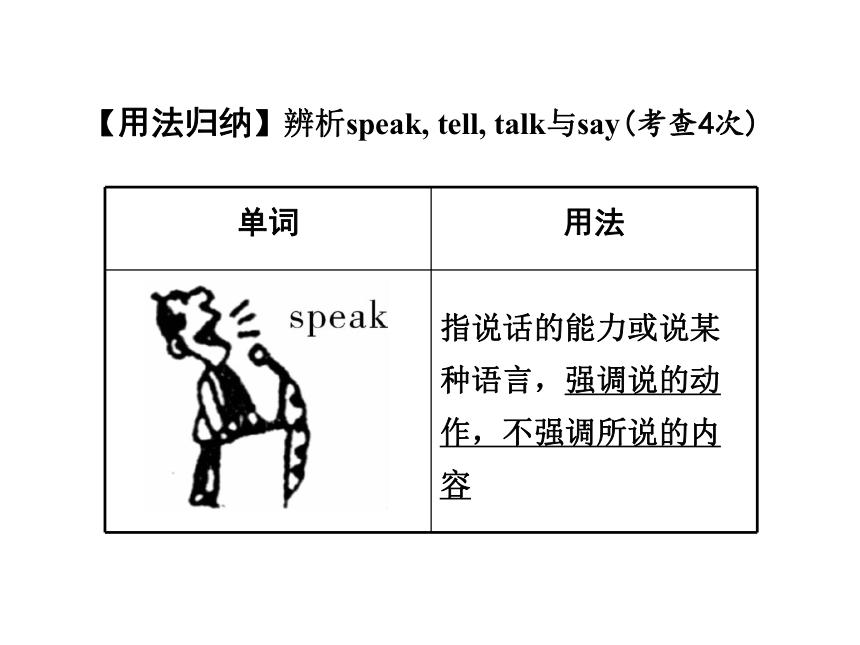
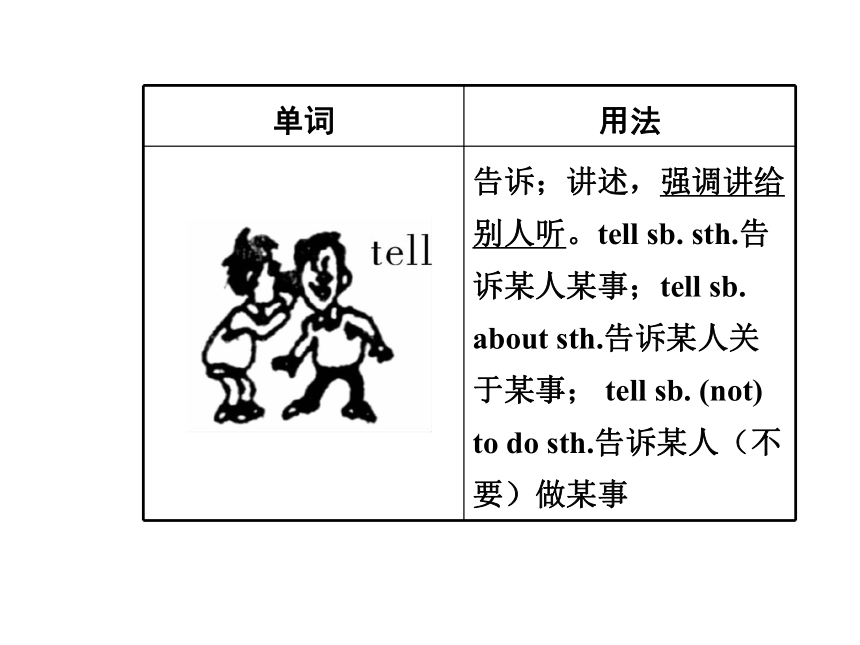
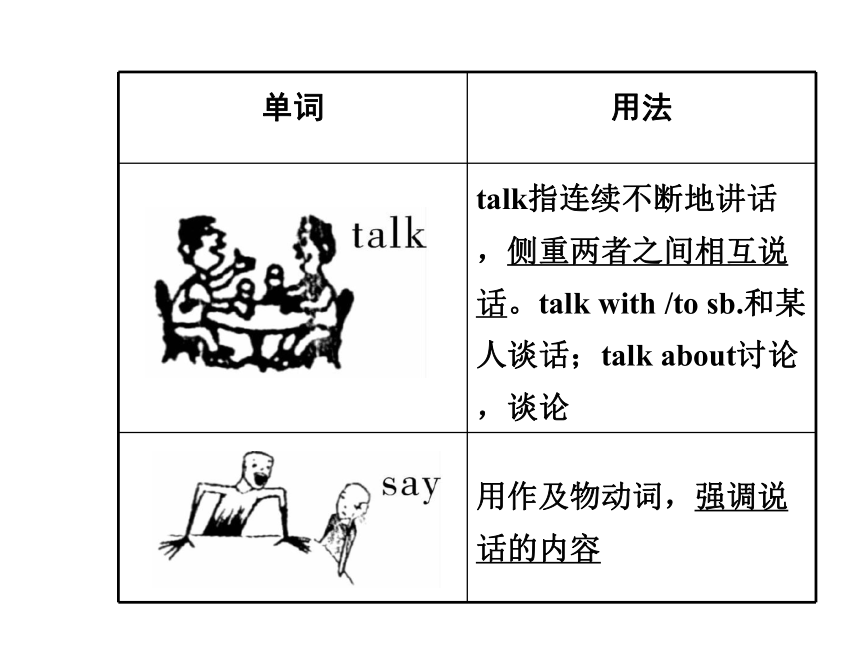
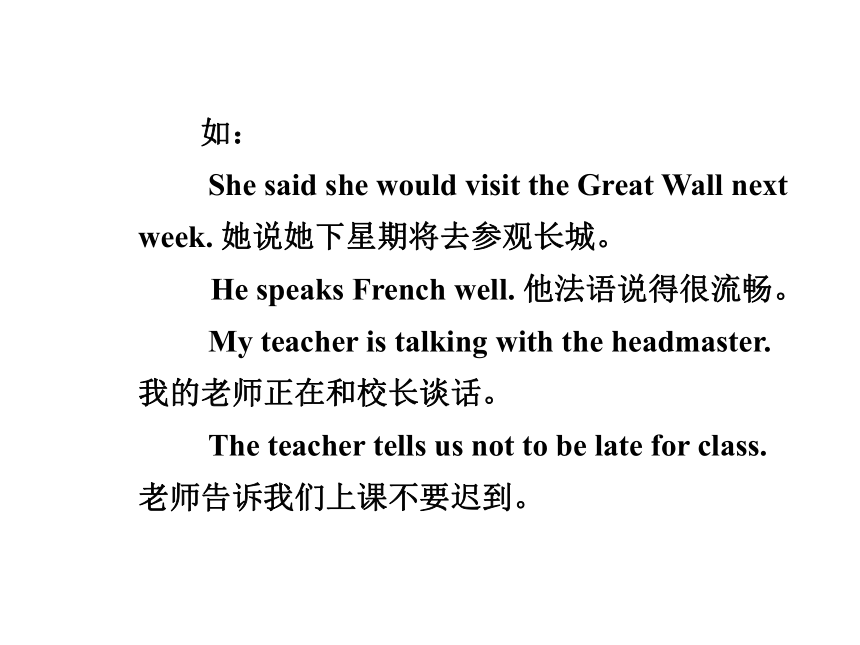

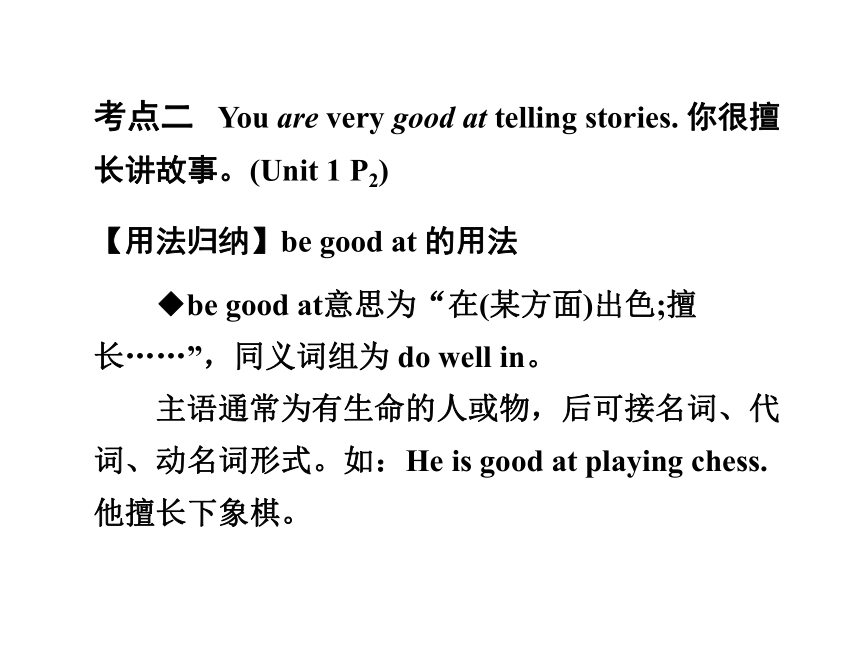
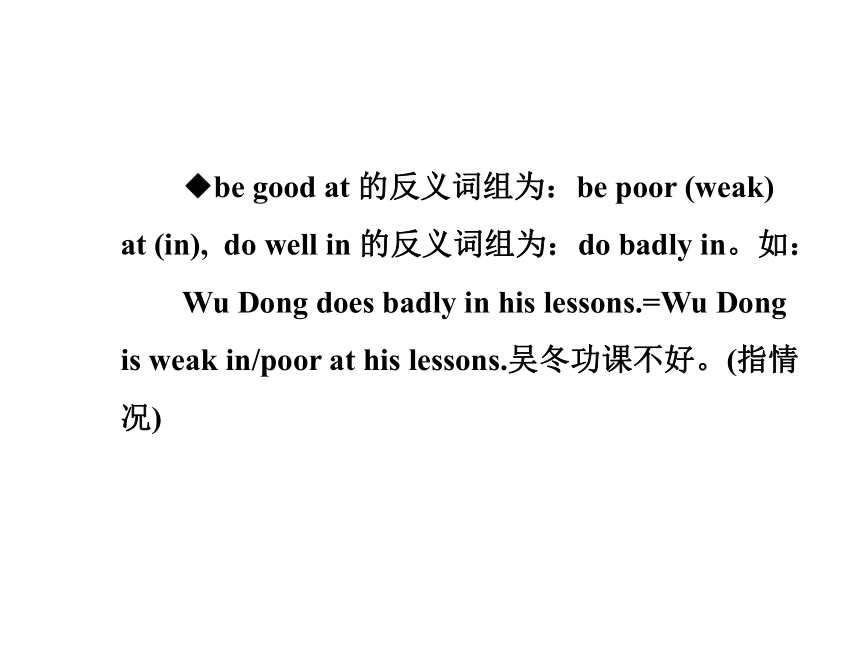
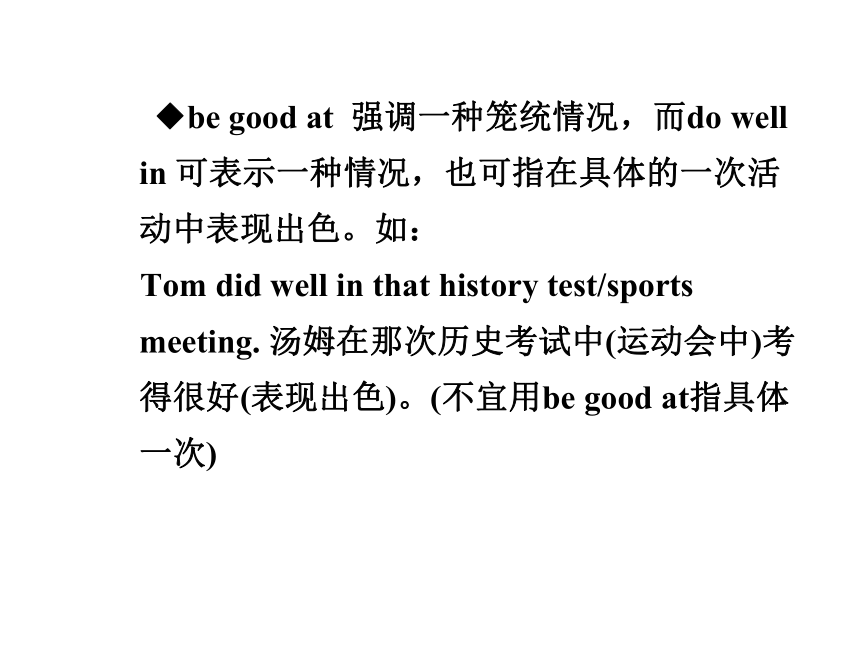
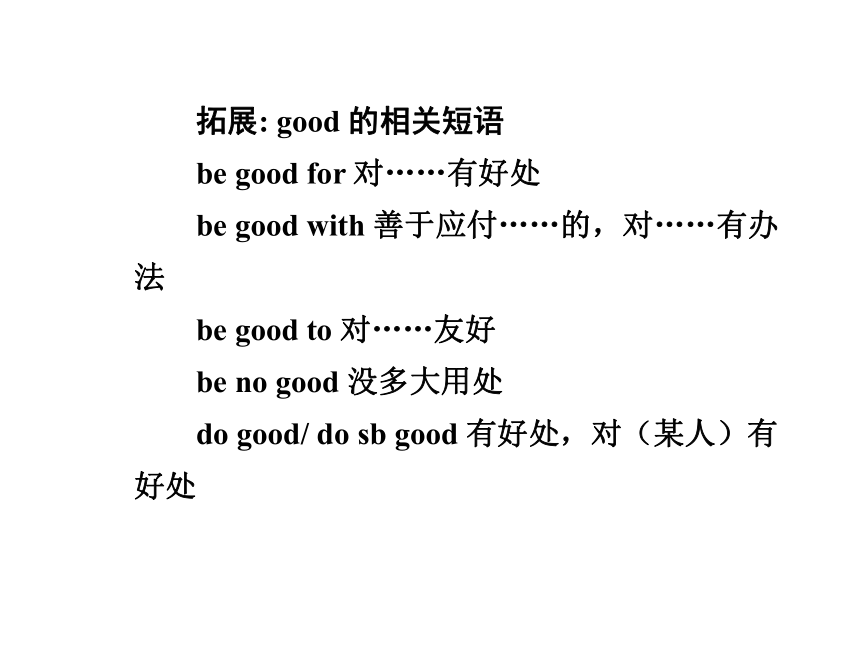

文档简介
课件84张PPT。七年级(下) Units 1-4第一部分 教材知识梳理考点精析
考点一 Can Wu Jun speak English?吴军会说英语吗?(Unit 1 P3)【用法归纳】辨析speak, tell, talk与say(考查4次) 如:
She said she would visit the Great Wall next week. 她说她下星期将去参观长城。
He speaks French well. 他法语说得很流畅。
My teacher is talking with the headmaster.我的老师正在和校长谈话。
The teacher tells us not to be late for class. 老师告诉我们上课不要迟到。现学现用考点二 You are very good at telling stories. 你很擅长讲故事。(Unit 1 P2)
【用法归纳】be good at 的用法
◆be good at意思为“在(某方面)出色;擅长……”,同义词组为 do well in。
主语通常为有生命的人或物,后可接名词、代词、动名词形式。如:He is good at playing chess. 他擅长下象棋。 ◆be good at 的反义词组为:be poor (weak) at (in), do well in 的反义词组为:do badly in。如:
Wu Dong does badly in his lessons.=Wu Dong is weak in/poor at his lessons.吴冬功课不好。(指情况) ◆be good at 强调一种笼统情况,而do well in 可表示一种情况,也可指在具体的一次活动中表现出色。如:
Tom did well in that history test/sports meeting. 汤姆在那次历史考试中(运动会中)考得很好(表现出色)。(不宜用be good at指具体一次) 拓展: good 的相关短语
be good for 对……有好处
be good with 善于应付……的,对……有办法
be good to 对……友好
be no good 没多大用处
do good/ do sb good 有好处,对(某人)有好处现学现用考点三 What time do they get dressed? 他们几点穿衣服?( Unit 2 P9)
【用法归纳】辨析dress, put on, wear与be inHe is putting on his clothes. He is wearing grey.拓展:dress的相关词组
dress in 穿着……衣服
dress oneself /sb. in sth.给自己或某人穿衣
dress up打扮,穿上盛装
dress sb. up 打扮某人
dress sb. up as 把某人装扮成……
be dressed in red 穿着红色衣服(表状态)
dress fashionably穿着时髦现学现用考点四 I either watch TV or play computer games.我或者看电视或者打电脑游戏。(Unit 2 P11)
【用法归纳】either的用法(考查3次)
◆ either用作代词,“(两者之中)任一、任何一个”。如:
Either (of the books) is popular with the students.(两本书)随便哪一本都受到同学们的欢迎。(主语)
I have bought two cakes. You may have either.我买了两块蛋糕,你要哪块都行。(宾语) ◆either用作副词,在否定句作“也”解释,通常置于句末。如:
Lily doesn’t like action movies. I don’t like, either.莉莉不喜欢动作片,我也不喜欢。
◆either...or...,意为“或……或……、不是……就是……、要么……要么……”,在句中连接两个并列成分。如:
Either you or Tom has done it.不是你就是汤姆做了这件事。(连接并列主语) 注意:在连接两个并列主语时,谓语动词必须在人称和数上与接近的主语保持一致。
◆either的反义词为neither“(两者)都不”,either...or...的反义词组为neither...nor...“既不……也不……”。现学现用考点五 Do they take the bus to school?他们乘公交车去学校吗?(Unit 3 P15)
【用法归纳】辨析take, by, in与on
◆take+冠词+交通工具。如:take a taxi/car/bus等。
◆by指通过某种手段或某种方式,常和交通工具的单数形式直接连用,例如:by bus/boat/ plane等。如:
My brother goes to school by bike. 我哥哥骑自行车去上学。 ◆当交通工具前有限定词时,介词可用“on”,也可用“in”。 in 接小型的交通工具,例如:in a car; on接大型交通工具,骑自行车除外,例如:on a bus。
注意:on还有一种特殊情况,表示“步行”,除了可以用动词walk之外,还可以用介词短语on foot。现学现用考点六 There is a very big river between their school and the village. 在他们的学校和村庄之间有一条很长的河。(Unit 3 P17)
【用法归纳】辨析between与among
◆between用于两者之间,只要可以构成双方关系,都可以用between。如:
I dropped it between my house and the station. 我把它落在了我家和车站之间。 ◆among在……之间,强调是在三个或三个以上的人或事物之中。如:
There was someone shouting at me among the students.学生中有个人在向我喊。
注意:指三者或三者以上的人或物中的每两者之间时,仍用between, 不能用among。如:
The relations between various countries are delicate and complicated.国与国之间的关系是微妙且复杂的。现学现用七年级(下) Units 5-8第一部分 教材知识梳理考点精析
考点一 It’s across from the park. 它在公园的对面。(Unit 8 P45)
【用法归纳】辨析across, over与through 如:
He struggled across a field against the heavy wind. 他顶着大风挣扎着穿过田野。
We must go over the mountain. 我们必须越过那座山。
Our earth moves through space. 我们的地球在太空中运转。现学现用考点二 People say that “an elephants never forgets”.人们说“大象永远都不会忘记的”。(Unit 5 P29)
【用法归纳】forget 的用法
◆forget to do sth. 忘记要做某事。如:
Don’t forget to turn off the light when you leave the room.你离开房间时别忘了关灯。 ◆forget doing sth. 忘记已经做了某事。如:
I’ll never forget finding that rare old coin in my room. 我不会忘记是在我的房间里找到了那枚珍贵的硬币。
◆forget (forgot; forgot/ forgotten) →forgetful adj. 健忘的,疏忽的 拓展:与forget用法相同的词有remember和stop。如:
Remember to bring my best wishes to your parents. 记得代我问候你的父母。
Do you remember getting some medicine for her last week? 你还记得上星期给她买药的事吗?
We are tired. Let’s stop to have a rest. 我们累了,停下来歇会儿吧。
Stop talking, please. 请不要说话了。 现学现用考点三 We must save the trees and not buy things made of ivory. 我们必须拯救树木,拒绝购买象牙制品。(Unit 5 P29)
【用法归纳】be made 短语 如:
Green tea is made from the leaves of the trees.绿茶是由叶子制成的。
The scarf is made of silk.这条围巾是由丝绸织成的。◆材料+be made into+成品(由……制成)
如:
The grapes are made into wine.这种酒是由葡萄酿成的。
◆be made up of 由……组成,如:
Our class is made up of six groups.我们班是由6个小组组成的。
◆be made in 在某地制造,如:
Silk is made in China. 丝绸产于中国。现学现用考点四 But there isn’t a Dragon Boat Festival in the US, so it’s like any other night for Zhu Hui and his host family. 但是在美国没有端午节,因此对于朱辉和他所在的家人来说,今晚和任何一个平常的晚上都一样。(Unit 6 P35)
【用法归纳】辨析other, the other, others, the others与another(考查3次) 如:
Do you have any other questions?你还有其他问题吗?
He has two daughters. One is a nurse, the other is a worker.他有两个女儿,一个是护士,另一个是工人。
Some of us like singing and dancing; others like playing sports. 我们中的一些人喜欢唱歌和跳舞,另一些人喜欢从事体育活动。
Two boys will go to the zoo, and the others will stay at home. 两个男孩将去动物园,其余的将留在家里。
I don’t like this one. Please show me another.我不喜欢这个。请让我看一下另外一个。现学现用考点五 How’s the weather? 天气怎么样?(Unit 7 P39)
【用法归纳】询问天气的句型(2012普洱36题考查)
◆How’s the weather?汉语意思为“天气怎么样?”how 为疑问副词,weather为不可数名词。它的回答应为It’s+表示天气的形容词。It’s sunny (阳光明媚的), cloudy (有云的), snowy (下雪的), rainy (多雨的), windy (有风的),foggy(有雾的)。如: —How’s the weather today, Li Ming? 李明,今天天气怎么样?
—It’s rainy. We should stay at home. 今天下雨,我们应该待在家里。
◆How’s the weather?=What’s the weather like?
What 为疑问代词,后加介词like。be like意为(像……样子)。如:How was the weather yesterday?=What was the weather like yesterday?昨天天气怎么样? How will the weather be tomorrow? =What will the weather be like tomorrow?明天天气怎么样? (注意系动词be在各种时态中的变化。)
◆在句末可以加上“介词+地点/时间”等短语。如:
How is the weather in Kunming? (=What is the weather like in Kunming?) 昆明天气怎么样?现学现用考点六 I like to spend time there on weekends. 我喜欢在那儿度过周末。 (Unit 8 P47)
【用法归纳】辨析spend, pay, cost与take(考查3次)
四者都有“花费”之意,但用法不同:spend, take, cost与pay的区别如下: 现学现用考点七 It is very quiet and I enjoy reading there.那里很安静,我很喜欢在那里阅读。(Unit 8 P47)
【用法归纳】 enjoy的用法
◆v. 享受,喜欢。adj. enjoyable 快乐的,令人愉快的n. enjoyment 享受,乐趣
用作动词 (v.) 后可接名词、代词或动词的分词形式作宾语。如:
Mike enjoys playing football with his classmates after school. 迈克喜欢放学后和他的同学踢足球。 ◆enjoy 后接反身代词,表示“过得愉快、玩得高兴”与 have a good/wonderful/nice time 同义,还等同于have fun。如:
We enjoyed ourselves during the holidays. = We had a good time during the holidays. 我们在假期玩得很愉快。现学现用七年级(下) Units 9-12第一部分 教材知识梳理考点精析
考点一 I may be a little late. 我可能会晚一点。 (Unit 9 P50)
【用法归纳】辨析a little, little, few与a few(考查4次)
a little, little, few, a few都可以修饰名词,这四个词的区别如下: 试比较:
1. There are a few differences between the two. 这二者之间有一些差异。
2. There is a little wine left in the bottle. 瓶子里还剩一点酒。
3. He has few friends. 他几乎没有朋友。
4. There is little wine left in the bottle. 瓶子里几乎没酒了。现学现用考点二 What does your friend look like? 你朋友长什么样?(Unit 9 P49)
【用法归纳】What does sb. look like?句型(2014昆明22题考查) ◆What does sb. look like? 用于询问某人的身材或长相。如:
—What does your uncle look like? 你叔叔长什么样?
—He’s a bit fat. He has short straight hair. 他有点胖,留着短直发。 ◆What be(am/is/are) sb. like? 常用于询问某人的性格或人品等。如:—What’s he like? 他是个什么样的人?
—He’s friendly and kind. 他友好善良。
注意:“What+be+主语+like?”句型的主语是人时,则是提问人的性格或内在的东西;“What+do/does+sb.+look like?”句型则只用来提问人的外表。现学现用考点三 I’d like some noodles. 我想要一些面条。 (Unit 10 P55)
【用法归纳】would like句型
would like...句中的like为动词,后面常接名词、代词和动词不定式,表示“想要……”, 与“sb. wants...” 意思相近,但前者语气比后者委婉。
主要用法有三种: ◆would like sth. 想要某物。 如: I would like some oranges. (=I want some oranges.) 我想要些桔子。
◆would like to do sth. 想要做某事。如:
I would like to drink a cup of tea. (=I want to drink a cup of tea.) 我想喝杯茶。
◆would like sb. to do sth. 想要某人做某事。 如:
I would like you to meet my family. (=I want you to meet my family. )我想要你见一见我的家人。 注意:would you like 与do you like 的区别
◆“Would you like..?中like后不可接动词?ing形式,而“Do you like...?”中like后却可以。如:
Do you like swimming? 你喜欢游泳吗?
◆对于“Would you like...?” 提出的建议或要求,肯定回答常用“Yes, please.”或“Yes, I would love/like to.” (I would可缩写为I’d); 否定回答常用“No, thanks.”。
对于“Do you like...?” 的答语,肯定回答用“Yes, I do.”; 否定回答用“No, I don’t.”现学现用考点四 Please reply in writing to this invitation by Friday, December 20th. 请在12月20日星期五之前,回复这个邀请。 (Unit 9 P71)
【用法归纳】辨析reply与answer
◆answer多指对问题的回答。还可表示接听电话或对门铃等声响作出反应等, 常与 telephone, door, bell, door-bell 等连用。但 reply 不能这样用。 如:A little girl answered the door. 一个小女孩应声去开门。
Nobody answered my call for help. 没有人理会我的呼救。
◆reply多指对某一陈述或主张的答复,后接名词或代词作宾语时,要在名词或代词前加介词to,但在接句子作宾语时不用介词to。如:
The head teacher replied to our questions. 班主任回答了我们的问题。
He replied that he disagreed. 他回答说他不同意。现学现用考点五 There were also too many people and I couldn’t really see or hear the guide.里面也有人,我真的不能看到或听到导游(说话)。 (Unit 11 P65)
【用法归纳】辨析hear, listen与sound
◆hear意为“听见,听到”,着重听的结果。
①hear sb. do sth.听到某人做某事的全过程。如:He was very embarrassed to hear people speak so highly of him. 他听见有人这样夸他, 感到很难为情。 ②hear sb. doing sth. 听到某人正在做某事。如:
I can hear you asking an important question. 我能听到你在问一个重要的问题。
◆listen一般用作不及物动词,指“留神听,倾听”,是有意识的动作。listen to相当于及物动词,意为“听……”,表示专心致志地“听”,后面一定要接人或物作宾语。如:We must listen to the teacher carefully in class. 我们在课堂上必须认真听老师讲课。 ◆sound作连系动词,意为“听起来”,常接形容词作表语。除接形容词外,还可接介词like。如:
That sounds like a good idea!那听起来是个好主意。现学现用
考点一 Can Wu Jun speak English?吴军会说英语吗?(Unit 1 P3)【用法归纳】辨析speak, tell, talk与say(考查4次) 如:
She said she would visit the Great Wall next week. 她说她下星期将去参观长城。
He speaks French well. 他法语说得很流畅。
My teacher is talking with the headmaster.我的老师正在和校长谈话。
The teacher tells us not to be late for class. 老师告诉我们上课不要迟到。现学现用考点二 You are very good at telling stories. 你很擅长讲故事。(Unit 1 P2)
【用法归纳】be good at 的用法
◆be good at意思为“在(某方面)出色;擅长……”,同义词组为 do well in。
主语通常为有生命的人或物,后可接名词、代词、动名词形式。如:He is good at playing chess. 他擅长下象棋。 ◆be good at 的反义词组为:be poor (weak) at (in), do well in 的反义词组为:do badly in。如:
Wu Dong does badly in his lessons.=Wu Dong is weak in/poor at his lessons.吴冬功课不好。(指情况) ◆be good at 强调一种笼统情况,而do well in 可表示一种情况,也可指在具体的一次活动中表现出色。如:
Tom did well in that history test/sports meeting. 汤姆在那次历史考试中(运动会中)考得很好(表现出色)。(不宜用be good at指具体一次) 拓展: good 的相关短语
be good for 对……有好处
be good with 善于应付……的,对……有办法
be good to 对……友好
be no good 没多大用处
do good/ do sb good 有好处,对(某人)有好处现学现用考点三 What time do they get dressed? 他们几点穿衣服?( Unit 2 P9)
【用法归纳】辨析dress, put on, wear与be inHe is putting on his clothes. He is wearing grey.拓展:dress的相关词组
dress in 穿着……衣服
dress oneself /sb. in sth.给自己或某人穿衣
dress up打扮,穿上盛装
dress sb. up 打扮某人
dress sb. up as 把某人装扮成……
be dressed in red 穿着红色衣服(表状态)
dress fashionably穿着时髦现学现用考点四 I either watch TV or play computer games.我或者看电视或者打电脑游戏。(Unit 2 P11)
【用法归纳】either的用法(考查3次)
◆ either用作代词,“(两者之中)任一、任何一个”。如:
Either (of the books) is popular with the students.(两本书)随便哪一本都受到同学们的欢迎。(主语)
I have bought two cakes. You may have either.我买了两块蛋糕,你要哪块都行。(宾语) ◆either用作副词,在否定句作“也”解释,通常置于句末。如:
Lily doesn’t like action movies. I don’t like, either.莉莉不喜欢动作片,我也不喜欢。
◆either...or...,意为“或……或……、不是……就是……、要么……要么……”,在句中连接两个并列成分。如:
Either you or Tom has done it.不是你就是汤姆做了这件事。(连接并列主语) 注意:在连接两个并列主语时,谓语动词必须在人称和数上与接近的主语保持一致。
◆either的反义词为neither“(两者)都不”,either...or...的反义词组为neither...nor...“既不……也不……”。现学现用考点五 Do they take the bus to school?他们乘公交车去学校吗?(Unit 3 P15)
【用法归纳】辨析take, by, in与on
◆take+冠词+交通工具。如:take a taxi/car/bus等。
◆by指通过某种手段或某种方式,常和交通工具的单数形式直接连用,例如:by bus/boat/ plane等。如:
My brother goes to school by bike. 我哥哥骑自行车去上学。 ◆当交通工具前有限定词时,介词可用“on”,也可用“in”。 in 接小型的交通工具,例如:in a car; on接大型交通工具,骑自行车除外,例如:on a bus。
注意:on还有一种特殊情况,表示“步行”,除了可以用动词walk之外,还可以用介词短语on foot。现学现用考点六 There is a very big river between their school and the village. 在他们的学校和村庄之间有一条很长的河。(Unit 3 P17)
【用法归纳】辨析between与among
◆between用于两者之间,只要可以构成双方关系,都可以用between。如:
I dropped it between my house and the station. 我把它落在了我家和车站之间。 ◆among在……之间,强调是在三个或三个以上的人或事物之中。如:
There was someone shouting at me among the students.学生中有个人在向我喊。
注意:指三者或三者以上的人或物中的每两者之间时,仍用between, 不能用among。如:
The relations between various countries are delicate and complicated.国与国之间的关系是微妙且复杂的。现学现用七年级(下) Units 5-8第一部分 教材知识梳理考点精析
考点一 It’s across from the park. 它在公园的对面。(Unit 8 P45)
【用法归纳】辨析across, over与through 如:
He struggled across a field against the heavy wind. 他顶着大风挣扎着穿过田野。
We must go over the mountain. 我们必须越过那座山。
Our earth moves through space. 我们的地球在太空中运转。现学现用考点二 People say that “an elephants never forgets”.人们说“大象永远都不会忘记的”。(Unit 5 P29)
【用法归纳】forget 的用法
◆forget to do sth. 忘记要做某事。如:
Don’t forget to turn off the light when you leave the room.你离开房间时别忘了关灯。 ◆forget doing sth. 忘记已经做了某事。如:
I’ll never forget finding that rare old coin in my room. 我不会忘记是在我的房间里找到了那枚珍贵的硬币。
◆forget (forgot; forgot/ forgotten) →forgetful adj. 健忘的,疏忽的 拓展:与forget用法相同的词有remember和stop。如:
Remember to bring my best wishes to your parents. 记得代我问候你的父母。
Do you remember getting some medicine for her last week? 你还记得上星期给她买药的事吗?
We are tired. Let’s stop to have a rest. 我们累了,停下来歇会儿吧。
Stop talking, please. 请不要说话了。 现学现用考点三 We must save the trees and not buy things made of ivory. 我们必须拯救树木,拒绝购买象牙制品。(Unit 5 P29)
【用法归纳】be made 短语 如:
Green tea is made from the leaves of the trees.绿茶是由叶子制成的。
The scarf is made of silk.这条围巾是由丝绸织成的。◆材料+be made into+成品(由……制成)
如:
The grapes are made into wine.这种酒是由葡萄酿成的。
◆be made up of 由……组成,如:
Our class is made up of six groups.我们班是由6个小组组成的。
◆be made in 在某地制造,如:
Silk is made in China. 丝绸产于中国。现学现用考点四 But there isn’t a Dragon Boat Festival in the US, so it’s like any other night for Zhu Hui and his host family. 但是在美国没有端午节,因此对于朱辉和他所在的家人来说,今晚和任何一个平常的晚上都一样。(Unit 6 P35)
【用法归纳】辨析other, the other, others, the others与another(考查3次) 如:
Do you have any other questions?你还有其他问题吗?
He has two daughters. One is a nurse, the other is a worker.他有两个女儿,一个是护士,另一个是工人。
Some of us like singing and dancing; others like playing sports. 我们中的一些人喜欢唱歌和跳舞,另一些人喜欢从事体育活动。
Two boys will go to the zoo, and the others will stay at home. 两个男孩将去动物园,其余的将留在家里。
I don’t like this one. Please show me another.我不喜欢这个。请让我看一下另外一个。现学现用考点五 How’s the weather? 天气怎么样?(Unit 7 P39)
【用法归纳】询问天气的句型(2012普洱36题考查)
◆How’s the weather?汉语意思为“天气怎么样?”how 为疑问副词,weather为不可数名词。它的回答应为It’s+表示天气的形容词。It’s sunny (阳光明媚的), cloudy (有云的), snowy (下雪的), rainy (多雨的), windy (有风的),foggy(有雾的)。如: —How’s the weather today, Li Ming? 李明,今天天气怎么样?
—It’s rainy. We should stay at home. 今天下雨,我们应该待在家里。
◆How’s the weather?=What’s the weather like?
What 为疑问代词,后加介词like。be like意为(像……样子)。如:How was the weather yesterday?=What was the weather like yesterday?昨天天气怎么样? How will the weather be tomorrow? =What will the weather be like tomorrow?明天天气怎么样? (注意系动词be在各种时态中的变化。)
◆在句末可以加上“介词+地点/时间”等短语。如:
How is the weather in Kunming? (=What is the weather like in Kunming?) 昆明天气怎么样?现学现用考点六 I like to spend time there on weekends. 我喜欢在那儿度过周末。 (Unit 8 P47)
【用法归纳】辨析spend, pay, cost与take(考查3次)
四者都有“花费”之意,但用法不同:spend, take, cost与pay的区别如下: 现学现用考点七 It is very quiet and I enjoy reading there.那里很安静,我很喜欢在那里阅读。(Unit 8 P47)
【用法归纳】 enjoy的用法
◆v. 享受,喜欢。adj. enjoyable 快乐的,令人愉快的n. enjoyment 享受,乐趣
用作动词 (v.) 后可接名词、代词或动词的分词形式作宾语。如:
Mike enjoys playing football with his classmates after school. 迈克喜欢放学后和他的同学踢足球。 ◆enjoy 后接反身代词,表示“过得愉快、玩得高兴”与 have a good/wonderful/nice time 同义,还等同于have fun。如:
We enjoyed ourselves during the holidays. = We had a good time during the holidays. 我们在假期玩得很愉快。现学现用七年级(下) Units 9-12第一部分 教材知识梳理考点精析
考点一 I may be a little late. 我可能会晚一点。 (Unit 9 P50)
【用法归纳】辨析a little, little, few与a few(考查4次)
a little, little, few, a few都可以修饰名词,这四个词的区别如下: 试比较:
1. There are a few differences between the two. 这二者之间有一些差异。
2. There is a little wine left in the bottle. 瓶子里还剩一点酒。
3. He has few friends. 他几乎没有朋友。
4. There is little wine left in the bottle. 瓶子里几乎没酒了。现学现用考点二 What does your friend look like? 你朋友长什么样?(Unit 9 P49)
【用法归纳】What does sb. look like?句型(2014昆明22题考查) ◆What does sb. look like? 用于询问某人的身材或长相。如:
—What does your uncle look like? 你叔叔长什么样?
—He’s a bit fat. He has short straight hair. 他有点胖,留着短直发。 ◆What be(am/is/are) sb. like? 常用于询问某人的性格或人品等。如:—What’s he like? 他是个什么样的人?
—He’s friendly and kind. 他友好善良。
注意:“What+be+主语+like?”句型的主语是人时,则是提问人的性格或内在的东西;“What+do/does+sb.+look like?”句型则只用来提问人的外表。现学现用考点三 I’d like some noodles. 我想要一些面条。 (Unit 10 P55)
【用法归纳】would like句型
would like...句中的like为动词,后面常接名词、代词和动词不定式,表示“想要……”, 与“sb. wants...” 意思相近,但前者语气比后者委婉。
主要用法有三种: ◆would like sth. 想要某物。 如: I would like some oranges. (=I want some oranges.) 我想要些桔子。
◆would like to do sth. 想要做某事。如:
I would like to drink a cup of tea. (=I want to drink a cup of tea.) 我想喝杯茶。
◆would like sb. to do sth. 想要某人做某事。 如:
I would like you to meet my family. (=I want you to meet my family. )我想要你见一见我的家人。 注意:would you like 与do you like 的区别
◆“Would you like..?中like后不可接动词?ing形式,而“Do you like...?”中like后却可以。如:
Do you like swimming? 你喜欢游泳吗?
◆对于“Would you like...?” 提出的建议或要求,肯定回答常用“Yes, please.”或“Yes, I would love/like to.” (I would可缩写为I’d); 否定回答常用“No, thanks.”。
对于“Do you like...?” 的答语,肯定回答用“Yes, I do.”; 否定回答用“No, I don’t.”现学现用考点四 Please reply in writing to this invitation by Friday, December 20th. 请在12月20日星期五之前,回复这个邀请。 (Unit 9 P71)
【用法归纳】辨析reply与answer
◆answer多指对问题的回答。还可表示接听电话或对门铃等声响作出反应等, 常与 telephone, door, bell, door-bell 等连用。但 reply 不能这样用。 如:A little girl answered the door. 一个小女孩应声去开门。
Nobody answered my call for help. 没有人理会我的呼救。
◆reply多指对某一陈述或主张的答复,后接名词或代词作宾语时,要在名词或代词前加介词to,但在接句子作宾语时不用介词to。如:
The head teacher replied to our questions. 班主任回答了我们的问题。
He replied that he disagreed. 他回答说他不同意。现学现用考点五 There were also too many people and I couldn’t really see or hear the guide.里面也有人,我真的不能看到或听到导游(说话)。 (Unit 11 P65)
【用法归纳】辨析hear, listen与sound
◆hear意为“听见,听到”,着重听的结果。
①hear sb. do sth.听到某人做某事的全过程。如:He was very embarrassed to hear people speak so highly of him. 他听见有人这样夸他, 感到很难为情。 ②hear sb. doing sth. 听到某人正在做某事。如:
I can hear you asking an important question. 我能听到你在问一个重要的问题。
◆listen一般用作不及物动词,指“留神听,倾听”,是有意识的动作。listen to相当于及物动词,意为“听……”,表示专心致志地“听”,后面一定要接人或物作宾语。如:We must listen to the teacher carefully in class. 我们在课堂上必须认真听老师讲课。 ◆sound作连系动词,意为“听起来”,常接形容词作表语。除接形容词外,还可接介词like。如:
That sounds like a good idea!那听起来是个好主意。现学现用
